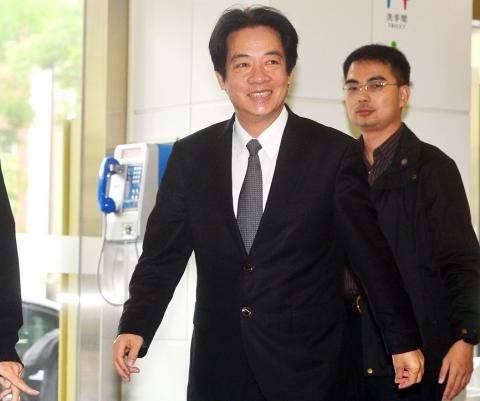Amid debates about the Cabinet’s latest draft amendment to the Labor Standards Act (勞動基準法), Premier William Lai (賴清德) has prompted controversy with his comment ruling out commute time as work.
Democratic Progressive Party (DPP) Legislator Lin Shu-fen (林淑芬) challenged Lai during a meeting with party lawmakers on Wednesday over the amendment’s proposal to allow some businesses to lower the minimum rest time between shifts from 11 hours to eight, the Chinese-language Apple Daily reported.
Lin said that workers would not be able to get a proper break, as the eight hours also include commuting and meal time.

Photo: Wang Yi-sung, Taipei Times
Lai reportedly told Lin that travel time and meal time are not work and that her criticism of the proposed amendment was based on nontypical working conditions, the report said, adding that Lai asked her not to openly criticize government officials longer than is needed.
Lai’s comments have prompted some criticism, as the act stipulates that injuries sustained during commute are defined as injuries on duty, although commute time is not part of work hours.
Executive Yuan spokesman Hsu Kuo-yung (徐國勇) yesterday said that the recognition of injuries caused by commuting accidents as injuries on duty does not qualify commute time as work hours.
Defending the proposed rest time regulations, Hsu said that the current legal rest time between shifts is eight hours, which the amendment would raise to 11 hours, but allow some flexibility for industries that have difficulty adjusting.
Lai did not ask Lin not to criticize officials, but only for her understanding of Minister of Labor Lin Mei-chu (林美珠), who recently had surgery, Hsu said.
While some have blamed the act for businesses’ breaches of overtime pay rules, Hsu said it is an issue of law enforcement and not the law itself, adding that law enforcement should be strict, but flexibility should be allowed for by the law.
Lai yesterday met with another group of DPP lawmakers, who asked the Cabinet to ensure the principles of a minimum of one day off every week and a minimum 11-hour rest between shifts.
DPP Legislator Wang Ding-yu (王定宇) said he proposed that the two principles should be written in the amendment, which should also clearly describe conditions for exceptions, such as listing the industries that can be exempted from the two principles.
Lai agreed that the two principles should be ensured, although he did not comment on the proposal, Wang said.
The DPP caucus has decided that the Cabinet’s amendment, as well as other amendments proposed by lawmakers, should pass a preliminary legislative committee review next week, Wang added.

Alain Robert, known as the "French Spider-Man," praised Alex Honnold as exceptionally well-prepared after the US climber completed a free solo ascent of Taipei 101 yesterday. Robert said Honnold's ascent of the 508m-tall skyscraper in just more than one-and-a-half hours without using safety ropes or equipment was a remarkable achievement. "This is my life," he said in an interview conducted in French, adding that he liked the feeling of being "on the edge of danger." The 63-year-old Frenchman climbed Taipei 101 using ropes in December 2004, taking about four hours to reach the top. On a one-to-10 scale of difficulty, Robert said Taipei 101

Taiwanese and US defense groups are collaborating to introduce deployable, semi-autonomous manufacturing systems for drones and components in a boost to the nation’s supply chain resilience. Taiwan’s G-Tech Optroelectronics Corp subsidiary GTOC and the US’ Aerkomm Inc on Friday announced an agreement with fellow US-based Firestorm Lab to adopt the latter’s xCell, a technology featuring 3D printers fitted in 6.1m container units. The systems enable aerial platforms and parts to be produced in high volumes from dispersed nodes capable of rapid redeployment, to minimize the risk of enemy strikes and to meet field requirements, they said. Firestorm chief technology officer Ian Muceus said

MORE FALL: An investigation into one of Xi’s key cronies, part of a broader ‘anti-corruption’ drive, indicates that he might have a deep distrust in the military, an expert said China’s latest military purge underscores systemic risks in its shift from collective leadership to sole rule under Chinese President Xi Jinping (習近平), and could disrupt its chain of command and military capabilities, a national security official said yesterday. If decisionmaking within the Chinese Communist Party has become “irrational” under one-man rule, the Taiwan Strait and the regional situation must be approached with extreme caution, given unforeseen risks, they added. The anonymous official made the remarks as China’s Central Military Commission Vice Chairman Zhang Youxia (張又俠) and Joint Staff Department Chief of Staff Liu Zhenli (劉振立) were reportedly being investigated for suspected “serious

American climber Alex Honnold is to attempt a free climb of Taipei 101 today at 9am, with traffic closures around the skyscraper. To accommodate the climb attempt and filming, the Taipei Department of Transportation said traffic controls would be enforced around the Taipei 101 area. If weather conditions delay the climb, the restrictions would be pushed back to tomorrow. Traffic controls would be in place today from 7am to 11am around the Taipei 101 area, the department said. Songzhi Road would be fully closed in both directions between Songlian Road and Xinyi Road Sec 5, it said, adding that bidirectional traffic controls would